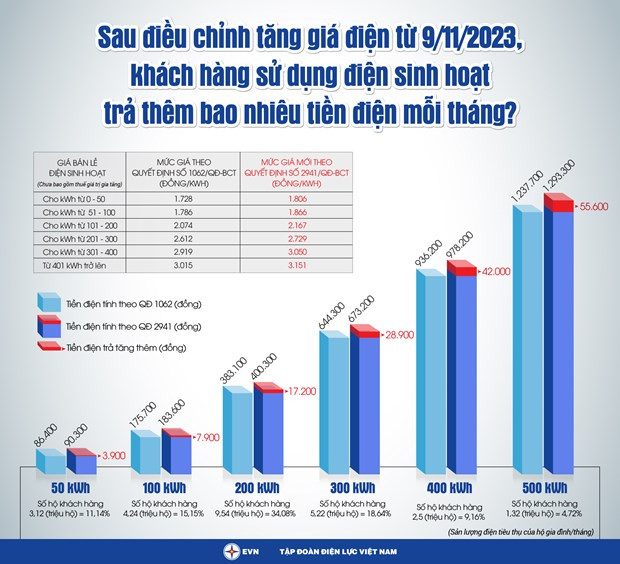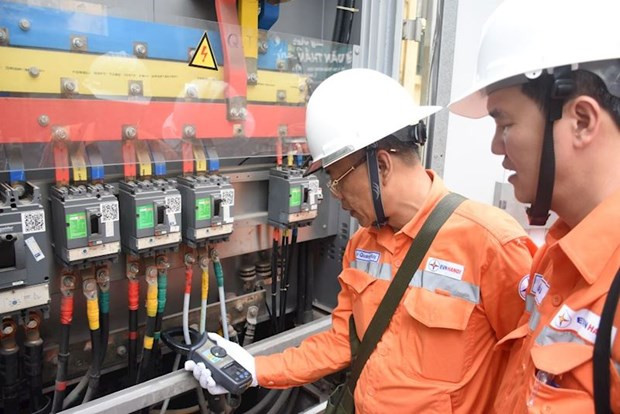After price adjustment, each household consuming less than 50kWh/month will have an average increase of about 3,900 VND/household in electricity bill; households consuming from 51-100kWh/month will have an average increase of about 7,900 VND/household.

On the afternoon of November 9, Vietnam Electricity Group (EVN) announced the adjustment of the average retail electricity price. Accordingly, the average retail electricity price from November 9, 2023 will increase from VND 1,920.37/kWh to VND 2,006.79/kWh (excluding value added tax). This adjustment is equivalent to an increase of 4.5% compared to the current average retail electricity price.
So how will the above adjustment affect electricity customers as well as the control of the consumer price index this year?
Poor households and policy families are not significantly affected.
According to the assessment data of the General Statistics Office, this electricity price adjustment is expected to cause the consumer price index (CPI) in 2023 to increase by only about 0.035%.
EVN representative said that basically, this electricity price adjustment ensures that poor households and policy families are not affected significantly. According to statistics in 2022, the whole country has over 1.27 million poor households and social policy households receiving electricity support according to the Government's policy.
Specifically, poor households are supported with a monthly support level equivalent to the electricity usage of 30kWh/household/month; social policy households with electricity usage of no more than 50kWh/month are supported with the equivalent of the electricity usage of 30kWh/household/month.
In addition, based on statistics on electricity customers in the first 9 months of 2023, EVN also made specific calculations on the impact on each electricity customer group.
Specifically, for customers using household electricity, after adjusting the price, each household consuming less than 50kWh/month, the average additional electricity bill is about 3,900 VND/household; households consuming from 51-100kWh/month, the average additional electricity bill is about 7,900 VND/household; households consuming from 101-200kWh, the average additional electricity bill is about 17,200 VND/household (this is the customer group with the largest proportion among household electricity customers (accounting for 34.08%).
In addition, for households consuming from 201-300kWh, the average additional electricity bill is about 28,900 VND/household; for households consuming from 301-400kWh, the average additional electricity bill is about 42,000 VND/household; for households consuming from 401kWh or more, the average additional electricity bill is 55,600 VND/household.

For manufacturing and service businesses, the impact of electricity price adjustments depends on customers' electricity usage behavior and the proportion of electricity usage in the total cost of the business.
Specifically, service business customers (547,000 customers), after the price change, will pay an average of 230,000 VND/month more for electricity; manufacturing customers (1,909,000 customers), will pay an average of 432,000 VND/month more for electricity; administrative and career customers (681,000 customers), will pay an average of 90,000 VND/month more for electricity.
Electricity price adjustment is carefully calculated.
According to EVN representative, this electricity price adjustment has been carefully calculated by Vietnam Electricity Group to minimize the impact on the economy and people's lives.
Sharing about the basis for adjusting the average retail electricity price, Mr. Nguyen Dinh Phuoc, Chief Accountant of EVN, said that this adjustment of electricity price is based on political, legal and practical grounds. Specifically, Resolution No. 55-NQ/TW dated February 11, 2020 of the Politburo on the orientation of Vietnam's National Energy Development Strategy to 2030, with a vision to 2045, requires: "applying market prices to all types of energy" and "removing all barriers to ensure transparent energy prices determined by the market."
In addition, the adjustment of EVN's retail price is also implemented according to Decision No. 24/2017/QD-TTg dated June 30, 2017 of the Prime Minister on the mechanism for adjusting the average retail electricity price.
Clause 5, Article 3 of Decision 24/2017/QD-TTg stipulates: "The minimum time for adjusting the average electricity price is 6 months from the most recent electricity price adjustment" and Clause 2, Article 3: "During the year, the average electricity price is considered for adjustment when the basic input parameters in the power generation stage fluctuate compared to the parameters used to determine the current average electricity price."

According to Mr. Nguyen Dinh Phuoc, in 2023, input costs for electricity production will increase, continuing to affect EVN's costs. For example, due to the impact of El Nino, hydropower output (a cheap source of electricity) will decrease by nearly 17 billion kWh compared to 2022; the output of coal, gas, and oil thermal power will increase.
Meanwhile, input fuel prices for power plants increased and remained high. The NewC Index imported coal price is expected to increase by 186% in 2023 compared to 2020 and 25% compared to 2021; the mixed coal price of the Vietnam National Coal and Mineral Industries Group is expected to increase by an average of 29.6% - 46.0% compared to 2021; the mixed coal price of the Dong Bac Corporation is expected to increase by an average of 40.6% - 49.8% compared to 2021. The Brent crude oil price is expected to increase by 100% compared to the average price in 2020 and increase by 18% compared to 2021.
In particular, the foreign exchange rate in 2023 will also increase sharply, expected to increase by 4% compared to 2021. These factors have directly affected EVN's electricity purchase costs and electricity prices.
“In 2022 and 2023, EVN has synchronously and drastically implemented cost-saving solutions such as saving regular costs by 15%, cutting major repair costs at a very high level, plus maximum savings in management work...,” said Mr. Nguyen Dinh Phuoc.
According to Mr. Nguyen Manh Hung, Chairman of the Vietnam Consumer Protection Association, electricity is a special commodity, the State applies a step-by-step price policy to encourage consumers to use electricity economically, the more you use, the higher the electricity price. However, in reality, there is still a situation of wasteful use of electricity.
“Determining that electricity is a national asset, the Vietnam Consumer Protection Association has always recommended that consumers save electricity and avoid waste. It is necessary to save electricity anytime, anywhere. We should limit the use of electricity during peak hours; turn off the lights when not needed; carefully choose devices that consume less electricity...,” Mr. Hung further recommended.
According to Vietnam+